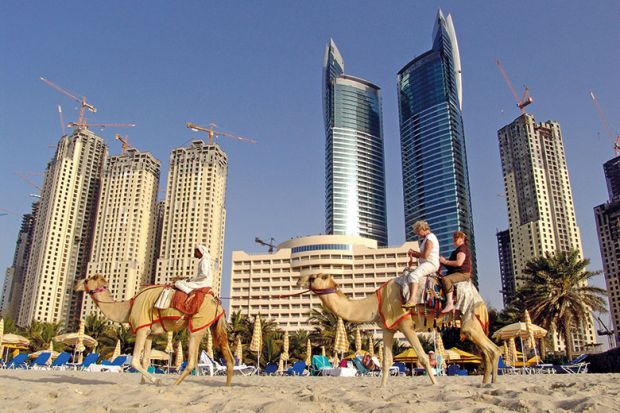The University of Birmingham will open its first international branch campus, in Dubai, next year.
Sir David Eastwood, Birmingham's vice-chancellor, told Times Higher Education that the offshoot will be situated within existing buildings at Dubai’s International Academic City from 2018, when it will run a “limited range of programmes” including business, economics, mechanical engineering, computer science and teacher education. It will then move to a purpose-built campus in 2020.
The aim is for the campus to reach its “full capacity” of 4,500 students within six years, by which time the institution will offer “a full range of science, engineering, business, social science and humanities programmes”, he said.
The degrees will be the same as those offered at the university’s home campus, Sir David continued, while teaching will be carried out by so-called “flying faculty” from Birmingham as well as academics recruited to work locally in Dubai.
The outpost will target prospective students in the Middle East, India, other parts of Asia and North Africa, while students in both Dubai and Birmingham will have opportunities to spend time studying at the other campus.
Dubai’s International Academic City, launched in 2007, is home to several international branch campuses, including those operated by Michigan State, Heriot-Watt and Murdoch universities.
Sir David said that he hopes University of Birmingham Dubai will stand out from the competition by offering education that is “at par with that at Birmingham in terms of quality and curriculum”, as well as developing its own “research capability”.
“Our students will be taught in a research-rich environment, whereas quite a lot of satellite campus developments are teaching only,” he added
Several recent academic studies have found that branch campus staff are less motivated and committed to their institutions than their counterparts at home campuses and also lack autonomy, while satellite campus leaders are often inexperienced and unsupported.
Another fundamental challenge for Birmingham will be ensuring that the campus is financially viable.
University College London announced that it would close its Australia branch campus in 2015, seven years after its launch, while the University of East London closed its Cyprus arm after just six months in 2013 because of poor recruitment.
Sir David said Birmingham will make an upfront investment to build the campus, after which it will be “self-sustained financially” through tuition fees paid by students.
“Some of the lessons that you learn from the less successful developments [are that] you need to know your market, you need to know your brand, you need to invest in early stage recruitment, and critically you need to invest upfront in quality, so the quality of the offer from day one is at the same level as the quality of the offer in the home university,” he said.
“The universities that have tried to launch campuses without making the appropriate investments I think have suffered and we’re not going to do that.”
Sir David added that the decision to open a satellite campus was triggered by “the strategic consideration of what a global university will look like in 10 years’ time”.
“I’m strongly of the view that if we look 10 years ahead the major global universities will be multi-campus universities internationally. You can already see that with universities such as New York University [which has campuses in Abu Dhabi and Shanghai],” he said.
Register to continue
Why register?
- Registration is free and only takes a moment
- Once registered, you can read 3 articles a month
- Sign up for our newsletter
Subscribe
Or subscribe for unlimited access to:
- Unlimited access to news, views, insights & reviews
- Digital editions
- Digital access to THE’s university and college rankings analysis
Already registered or a current subscriber?






